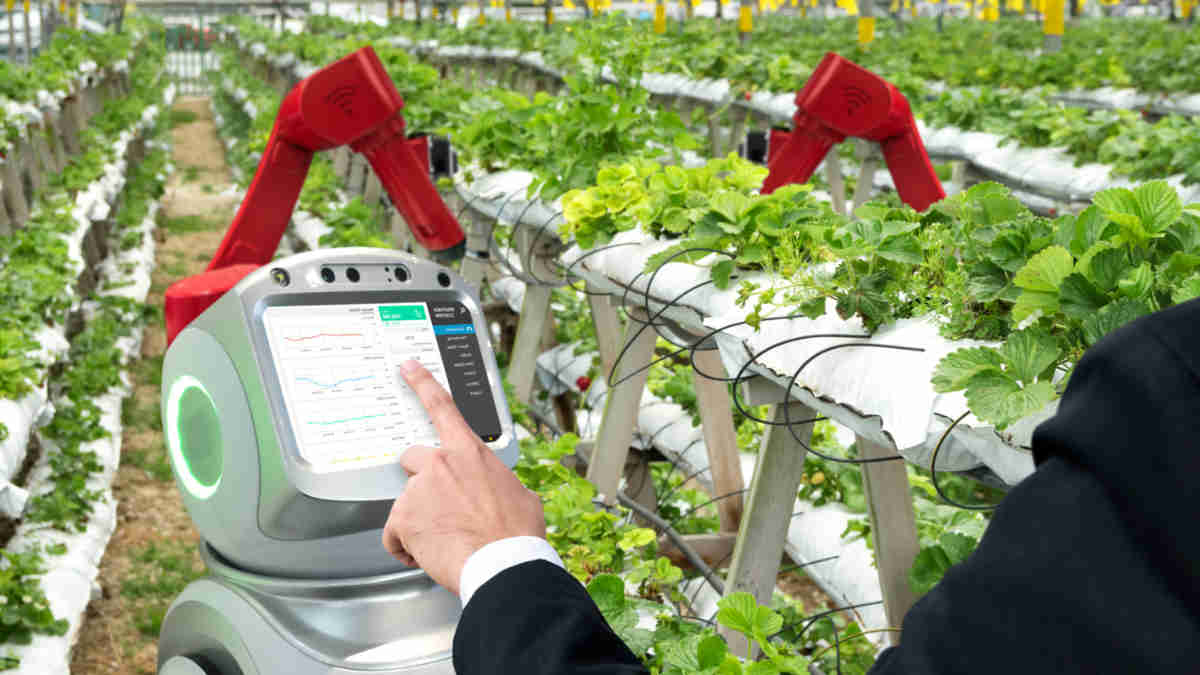The Ethical Investor: Agritech is key to our food-driven climate problem, and Roots believes it can solve it

ROOTS’ technology helps to solve food sustainability and climate problems. Picture Getty
- Food sustainability is becoming a major global problem
- The future of our climate as a result of unsustainable food production seems bleak
- Stockhead reached out to ASX-listed Roots Sustainable Agricultural Tech CEO, Boaz Wachtel
Finnish food tech company, Solar Foods, took the world by storm last week when it unveiled an ingredient that can supposedly be used to make anything from bread to pasta.
The company said the powdery substance, which it calls Solein, is produced from just air, water, electricity and microbes.
The mustard-yellowish ingredient made its global debut in Singapore after the city-state approved sale of the product last October.

According to the company, Solein comprises 65% to 70% protein, 5% to 8% fat, and has a composition similar to that of dried soy or algae.
The ingredient was made using a technology that’s growing in popularity, microbial fermentation. It’s a metabolic process carried out by microorganisms, such as bacteria, yeasts, or fungi, in the absence of oxygen.
It’s similar to the way beer is brewed; instead of sugar, microbes feed on nitrogen and carbon dioxide, and begin to grow. Unlike brewing however, excess water is removed before it’s dried, forming the powdery-like substance.
This technology is gaining attention among environmentalists as it has the potential to produce edible calories without generating greenhouse gases or the need for farmland.
Time is running out
Our global food system is vast, complex, and increasingly unfit for purpose.
Conventional agricultural practices often involve the use of synthetic fertilisers and pesticides, which can lead to soil degradation, water pollution, and biodiversity loss.
Climate change, i.e. heat waves, floods and water scarcity are also disrupting food production everywhere.
Urbanisation is chopping parcels of fertile lands, population growth is unsustainable (especially in Africa and the Middle East), and soil quality is deteriorating due to excessive fertilizer use.
Additionally, the expansion of agricultural land often results in deforestation, which further contributes to climate change and loss of habitat.
Against this backdrop, the future of sustainable food production seems bleak.
The CEO of ASX-listed Roots Sustainable Agricultural Technologies (ASX: ROO), Boaz Wachtel, believes that our window to address this problem is closing fast.
“There are no easy answers, but they exist,” Wachtel told Stockhead.
“Governments usually fail to support climate mitigation technologies in agriculture. This needs to change rapidly in order to meet the food security challenge for next generations,” he said.
New ways of doing things needed
Wachtel says there are a number of ways we can produce more and more food without damaging our climate.
First, we must change some portions of industrial agriculture to organic growing methods (which has been a major initiative in India).
“We must let go of single crop growing, and replace it with rotating and multiple crops to avoid the spread of diseases and reduce fertilisation scope,” Wachtel explained.
New irrigation technologies that save water usage would also need to be adopted.
“We can produce more crops by moving greenhouses partially underground to save air climate management energy.
“International campaigns should launched to educate and reduce meat and fish eating, because at the moment, more than half of agricultural production is aimed for livestock feeding,” said Wachtel.
Quick look into ROOTS’ technologies
ROOTS has developed two revolutionary technologies to address these problems.
The first is the Root Zone Temperature Optimization technology, which is aimed to keep roots at an optimal temperature year round, i.e. cool during the summer and warm during the winter.
Because root temperature is the most critical variable in a plant’s survival, using this technology can achieve greater yield with 90% less energy, compared to air heating and cooling.
The second proprietary technology ROOTS has developed is the Irrigation by Condensation (IBC), which allows farmers to irrigate crops with just the humidity in the air.
This is an on/off grid system that chills water to below dew point, and circulates them in a closed cycle to produce condensation on the surface of the pipes that then flows to the soil by gravity.
Cooled roots through this condensation lowers the plant’s overall water consumption as well.
Wachtel says IBC is an option for farmers who have no access to water, or for those who seek to augment existing supplies.
“If the solar version of IBC is used, the farmer can enjoy, with one time investment, guaranteed food security for years to come,” he added.
North America an important market
Wachtel explained that as the climate heats up, agricultural production will move more to northern and southern countries where climates are cooler during the summer (for example Canada, Russia, Southern Argentina).
“This poses a labor problem as availability of cheap labor often dictates the location of food production,” he said.
The change, he said, will need to be accompanied with the adoption of mechanised and robotic farming.
North America is a huge food market, and California produces over 70% of fruits and vegetables for the USA and Canada.
“Food production will need to be moved next to population centres to save on long and polluting shipping hauls,” Wachtel told Stockhead.
He believes that indoor and vertical farming will be part of the solution in sophisticated markets such as North America, where the company has secured a design patent with the United States Patent Office (USPO) for its unique Heat Exchange Probe (HEP) technology.
“Incorporating ROOTS’s Root zone temperature optimisation technology in this upcoming trend is already in the making,” he said.
Agritech stocks on the ASX
Other pure play agriech stocks on the ASX include:
| Code | Name | Price | % Month | % 6-Month | Market Cap |
|---|---|---|---|---|---|
| BGT | Bio-Gene Technology | 9.10 | -15.35 | -20.87 | $16,110,032 |
| ROO | Roots Sustainable | 0.50 | -28.57 | -79.17 | $693,611 |
| RLF | Rlfagtechltd | 17.50 | -7.89 | 9.38 | $15,904,562 |
Bio-Gene produces a range of patent-protected platforms, QCIDE and Flavocide, targeted at the insecticides market.
These technologies are based on naturally occurring beta-triketones, a type of chemistry that may offer new solutions for insect management control in crop protection (including grain storage).
The insecticidal activity of the beta-triketone chemical was first discovered following a botanical screening program looking to identify natural product-based insecticides in Australian flora.
RLF Agtech is a tech-driven plant nutrition company that develops plant nutrition products.
RLF’s Plant Proton Delivery Technology enables farmers to grow higher-yielding, better quality, and more nutritious produce while supporting the plants’ natural ability to store and reduce atmospheric carbon.
The company’s Accumulating Carbon in Soil System (ACSS) can capture and store CO2 by increasing the organic matter in the world’s soils.
At Stockhead we tell it like it is. While Roots Sustainable Agricultural Technologies is a Stockhead advertiser, it did not sponsor this article.
Related Topics
UNLOCK INSIGHTS
Discover the untold stories of emerging ASX stocks.
Daily news and expert analysis, it's free to subscribe.
By proceeding, you confirm you understand that we handle personal information in accordance with our Privacy Policy.








